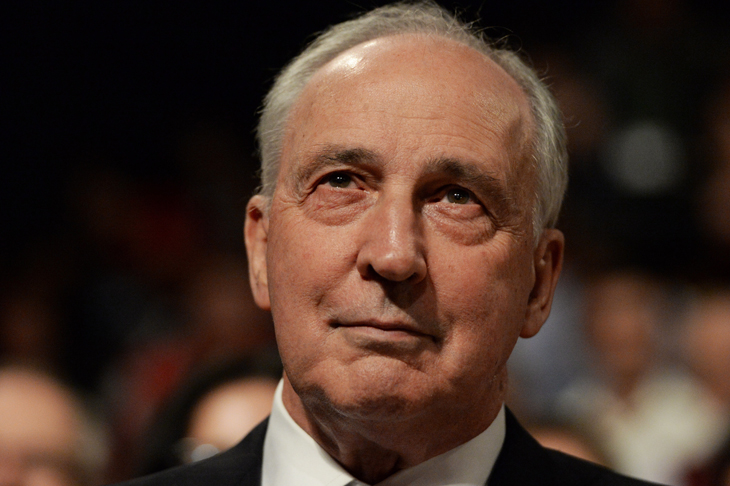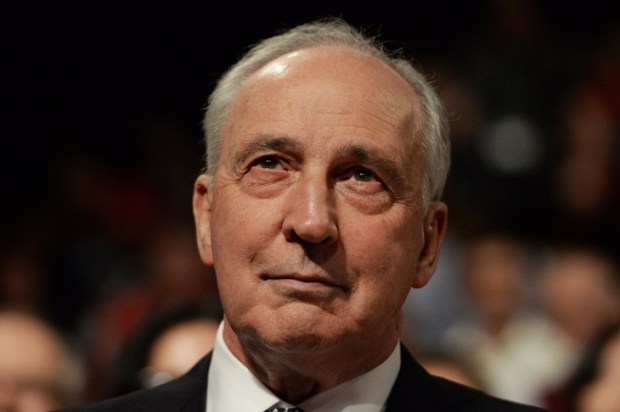‘Every now and then you have to flick the switch to vaudeville,’ former prime minister Paul Keating once said, and Labor’s campaign launch was one of those occasions. Mr Keating had no intention of simply turning up for a bizarre photo opportunity that lined up Labor’s three most recent prime ministers, each a regicide, to shake hands with the heir apparent and regicide-in-chief.
So eager was the former PM to speak out that he turned up early for his interview with the ABC. Nobody mentioned that Mr Keating sits on the International Advisory Board of the China Development Bank but it was worth noting given that he used the interview to curse the Coalition and its coal-ophilia with the same passion he devoted to kowtowing to China, a country which, he reminded viewers, had dragged 20 per cent of humanity out of poverty. It didn’t seem to occur to Mr Keating that it was coal — a lot of it Australian — that China had used to raise itself from its pitiful penury. ‘Coal is the fuel of the industrial revolution 250 years ago. It’s all over,’ Mr Keating pronounced, also seemingly oblivious to the fact that coal is Australia’s most valuable export, worth about $67 billion this financial year, and China is the world’s largest consumer of coal.
It was too much, even for the ABC’s Andrew Probyn, who observed, ‘It’s worth a helluva lot of money to the federal treasury.’ When Mr Keating retorted that coal was a fossil and the Prime Minister was ‘a fossil with a baseball cap,’ Mr Probyn responded that coal was a fossil that had allowed Australia to build roads, schools and hospitals and asked Mr Keating what he would do to replace the income.
It was at this moment that Mr Keating flicked the switch. Renewable energy was the answer, he explained. Continental Australia ‘was one of the hot plates of the world’ and ‘you could almost fry and egg on any footpath or any roadway at any time anywhere in this country.’ Talk about vaudeville — it conjured up images of ‘Barney Google, with the goo-goo googly eyes,’ more than rational energy policy. But Mr Keating was undaunted. ‘Only the Liberal Party could think up going back to Stephenson’s steam engine of 1750 and wanting to build new coal-fired power stations. They’re just living in the past,’ he said shaking his head.
It’s not just the date that George Stephenson built his ‘Rocket’ — it was 1829 — that Mr Keating got wrong. Coal-fired power isn’t just a nostalgic yearning of the Australian government for ‘Chattanooga Choo-Choo’ — ‘shovel all the coal in, gotta keep a rollin’. There was a 12 per cent increase globally in coal-fired generation in 2018, with two-thirds of that new capacity coming online in China, and the rest not just in developing countries such as India and Indonesia but in developed countries such as Japan.
But it was Mr Keating’s explanation about how Labor would improve relations with China that was really alarming. Mr Shorten has said he will not ‘pre-emptively frame China only as a threat.’ Mr Keating spelt out what that meant. ‘I think a Labor government would make a huge shift, just merely making the point that China’s entitled to be there, rather than being some illegitimate state that has to be strategically watched,’ he explained.
‘Nobody’s questioning its legitimacy to be there but isn’t it the more nefarious actions of the Chinese government that has our security agencies concerned,’ asked the ABC’s Jane Norman before she was cut off, peremptorily, by Mr Keating. It was the ‘nutters’ running Australia’s security agencies who were the problem, he retorted. ‘(When) you have the Asio chief knocking on MPs’ doors, you know something’s wrong,’ Mr Keating said.
Something is indeed wrong when a former general secretary of the NSW Labor party and serving Labor senator thinks it’s okay to ask a donor with links to the Chinese Communist Party to pay his bills, offers the same donor advice on how to avoid the surveillance of the security agencies and starts parroting Chinese policy on the South China Sea rather than that of his own party.
It was Mr Keating’s advice as to what to do that was a revelation. ‘You’d clean them out,’ Mr Keating said, claiming that they’d all ‘gone berko.’ It was a breathtaking insight into the ruthlessness of the man once known as the Bonaparte of Bankstown but before there was time for it to sink in, Mr Keating was back to his reverential bowing and scraping. ‘You know, China, whatever you think, China is a great state. It’s always been a great state and now has the second-largest economy, soon the largest economy in the world. If we have a foreign policy that does not take that into account, we are fools.’
Of course, no-one in the intelligence community, or the government, or the general populace doubts that China is immensely powerful or that it is extremely important to Australia as our largest export destination. That is precisely why the situation is so difficult to manage; the Chinese Communist Party is now overtly Leninist and consequently even more repressive at home, China is rapidly arming itself, it has revealed hegemonic ambitions in critical spheres such as the high-tech sector, and it is actively seeking to buy influence in Australia, while conducting surveillance on anyone it perceives as a threat.
The day after the launch Mr Shorten moved into damage control mode and said that he didn’t share Mr Keating’s views, at least about the heads of Australia’s security agencies being nutters. But Anthony Albanese, the shadow minister for infrastructure, transport, cities and regional development, and the main pretender to Shorten’s throne, was quick to say that he shared Mr Keating’s concerns, warning that it was not in Australia’s economic interests to be ‘xenophobic’ about China’s role in the region.
Xenophobia, or ‘Sinophobic blatherings’ as the Vice-Chancellor of the University of Sydney put it, is the accusation that is thrown at anyone who dares to criticise Chinese policies or speaks up about Chinese coercion and threats. No doubt there is a price to pay for standing up to China. Despite Mr Keating’s dim view of its value, China has imposed a ‘go slow’ on Australian coal at Dalian port, almost certainly as a reprisal for Australia blocking, for security reasons, China’s telco Huawei from its 5G mobile rollout. But in Mr Keating’s music hall, there is only one question and it is not can you do the can-can, but can you do the kowtow.
Got something to add? Join the discussion and comment below.
Get 10 issues for just $10
Subscribe to The Spectator Australia today for the next 10 magazine issues, plus full online access, for just $10.
You might disagree with half of it, but you’ll enjoy reading all of it. Try your first month for free, then just $2 a week for the remainder of your first year.














Comments
Don't miss out
Join the conversation with other Spectator Australia readers. Subscribe to leave a comment.
SUBSCRIBEAlready a subscriber? Log in